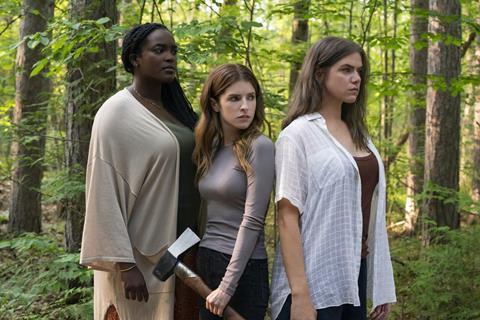Anna Kendrick shows her vulnerable side as a woman stuck in a psychologically abusive relationship

Dir: Mary Nighy. Canada/US. 2022. 89mins
The psychological character study Alice, Darling examines the kind of abusive relationship that’s not as often depicted — one in which the harm is emotional and mental, not physical. Anna Kendrick gives a wounded, vulnerable performance as a young woman who thinks her boyfriend loves her, only to slowly discover all the ways in which his possessiveness is destroying her self-esteem and eroding her well-being. Making her feature debut, director Mary Nighy transforms a story of three female friends on a seemingly carefree getaway into a meditation on the invisible but significant ways that women are imperilled on a daily basis.
The film explores how Alice gradually becomes aware of the emotional abuse she’s endured and Kendrick gives that transformation resonance
After premiering at the Toronto Film Festival and earning an Oscar-qualifying run, Alice, Darling will open in UK and US theatres on January 20. Kendrick is operating in a more dramatic vein than usual, and supportive reviews should help raise visibility for this low-budget, small-scale work.
Alice (Kendrick) appears to have a good life, including a fulfilling job and a successful artist boyfriend, Simon (Charlie Carrick). But when her close friends Tess (Kaniehtiio Horn) and Sophie (Wunmi Mosaku) plan a woodsy vacation for just the three of them to celebrate Tess’ birthday, Alice gets nervous, lying to Simon that she’s going to be gone for a business trip. The more time that Tess and Sophie spend with Alice, the more they realise that her behaviour is erratic — almost as if Simon is controlling her, even though he’s many miles away.
Written by Alanna Francis, the picture burrows into the quiet torment inside Alice’s head. Kendrick’s anxious eyes and meek manner help communicate this woman’s anguish, documenting how the character has been systematically beaten down emotionally by Simon who, we learn through flashbacks, has constantly criticised her. These brief moments from the past, inserted like lingering hurts by editor Gareth C. Scales, make Simon feel intensely present, even though he’s not there with Alice and her friends. But Alice, Darling argues that, for Alice, he might as well be in the room.
This is tonally delicate narrative terrain, relying on Kendrick to play an intelligent person who, nonetheless, has been brainwashed to a certain extent. It’s a testament to the Oscar-nominated actress that she deftly illustrates Alice’s vibrancy and smarts while, at the same time, being hobbled by these negative thoughts about herself. (An early red flag for Alice’s friends is the intense shame she feels when she has an erotic dream about a handsome waiter.) The film explores how Alice gradually becomes aware of the emotional abuse she’s endured and Kendrick, assisted by Horn and Mosaku’s lived-in performances, gives that transformation resonance, letting Alice be weak so eventually she can be strong.
Intriguingly, the film simultaneously introduces a subplot involving a missing local girl who becomes an object of fascination for Alice. Without overdoing the metaphor, Alice, Darling suggests that its protagonist sees in this girl a fellow troubled woman, drawn to help her even before she comes to understand that she, herself, needs help. This subplot is woven into the main story gracefully, as is the surprise reappearance of Simon, who Carrick plays with an abundance of charm. It’s a pointed performance that underlines how many abusers come across as upstanding, sensitive men, their darker motives only revealed after they gain their victims’ trust.
Aided by Owen Pallett’s occasionally jittery score, Alice, Darling can sometimes possess the faint air of a thriller, albeit one in which the central menace is offscreen, far removed from Alice and her friends. But Kendrick, who has said she’s experienced psychological abuse in a past relationship, wrings dramas from Alice’s internal trauma. Alice reflexively pulls her hair out, obsessively checks her phone to see if Simon is looking for her, and then debates going home early so that he won’t be alone for too long. As much as Alice can frustrate Tess and Sophie with her codependent behaviour, they – and the film – seem to understand something essential about such toxic relationships: that the damage may not be as perceptible as when someone is physically abusive, but the scars are there all the same.
Production companies: Babe Nation Films, Elevation Pictures
Worldwide distribution: Lionsgate (Canada: Elevation)
Producers: Katie Bird Nolan, Lindsay Tapscott, Christina Piovesan, Noah Segal, Sam Tipper-Hale
Screenplay: Alanna Francis
Cinematography: Mike McLaughlin
Production design: Jennifer Morden
Editing: Gareth C. Scales
Music: Owen Pallett
Main cast: Anna Kendrick, Kaniehtiio Horn, Charlie Carrick, Wunmi Mosaku
























